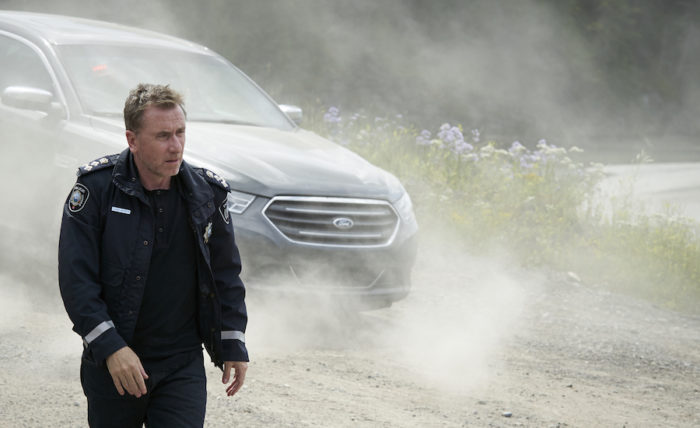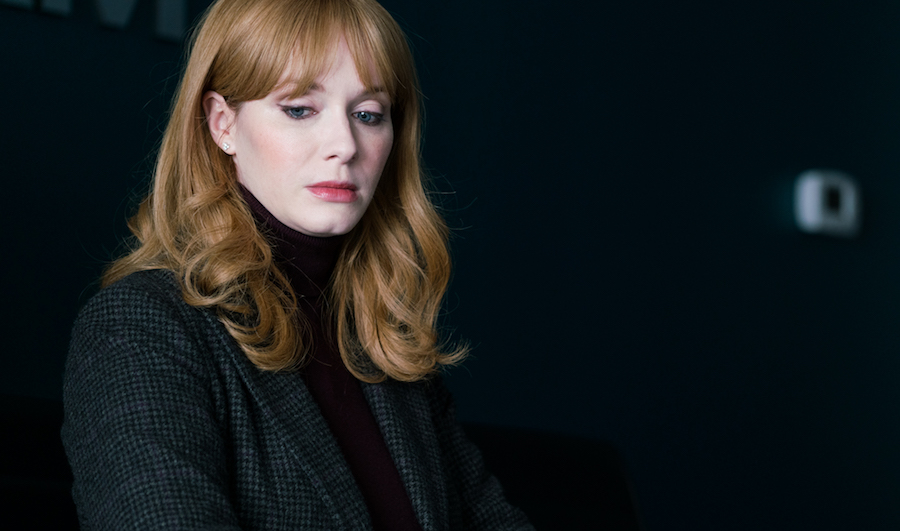Why you should be watching Tin Star
Review Overview
Cast
8Consistency
6Consequences
8David Farnor | On 07, Sep 2017
Tim Roth is one of those actors who’s so good you barely even notice him. From blending into David Lynch’s Twin Peaks and anchoring British drama Broken to busting blocks in The Incredible Hulk and Tim Burton’s The Planet of the Apes, he’s as eclectic as he is excellent. His chances to shine in the spotlight are rare, resulting in the creepy nurse drama Chronic and the scene-stealing hilarity of Oswaldo in Tarantino’s The Hateful Eight. Sky original drama Tin Star gives him another chance to take the lead – and he grabs it with both hands.
He plays Jim Worth, a former London copper turned Sheriff in Little Big Bear, Canada. Jim’s hoping for a fresh start in the Rockies, where he can focus on looking after his family – wife Angela, daughter Anna and son Petey – and kicking his addiction to the bottle. The rules of TV, though, dictate that a new life is never that simple, and, sure enough, his hoped-for domestic expat bliss is blown away within the first episode.
Rowan Joffe, who wrote Before I Go to Sleep and 28 Weeks Later, is quick to stream the lakeside town with intriguing psychological drama and nail-biting action – the final sequence of the opening hour is horrifying brutal, given added weight by the trauma and shock visibly weighing on the shoulders of Roth’s troubled law man. There’s a familiar knack from the man who penned The American for balancing bursts of violence with a quiet, rural backdrop – a juxtaposition that has gotten no less satisfying over decades of crime drama.
But the Joffe who gave us the Brighton Rock remake is also present, as the show’s opening episodes expand their scale a little too quickly and ramp up the melodrama without hesitation. The basic premise of a quiet Canadian town tainted by the arrival of a major company, North Stream Oil, which brings with it corporate greed, criminals and cash-flashing migrant workers, is full of dramatic promise and topical interest. However, it’s also full of clunky dialogue and occasionally uneven shifts in tone.
The series is ostensibly a tale of revenge, as Jim seeks to rid the town of the blood-soaked corruption that’s polluting its streets. When it’s focusing on the family man doing right by his loved ones, it’s a hugely compelling watch, as Jim begins an inevitable slide back down the neck of a whisky bottle. Essentially becoming another person (remnants of his old undercover persona, Jack, flash to the surface), the show captures the striking disjoint between the two sides of our hero, as one downs shots in the local bar and unleashes punches in the toilets, while the other stares ominously out of a mirror.
It’s a rampage that causes his path to cross with Elizabeth Bradshaw (Christina Hendricks), the PR guru for North Stream. Hendricks does a great job of bringing more than just cunning menace to her company woman, turning the role into an ambiguous spin doctor who also longs to change the dirty industry from the inside. As they square off, a growing number of hoodlums appear in between, all watched warily by Denise (Sarah Podemski), Jim’s loyal second-in-command. She’s a First Nation Canadian, balancing the town’s expanding footprint with protecting the local Reserve – and her father who lives there.
For all the engrossing drama that scenario entails, though, Tin Star is a crime series that’s very fond of its crime, introducing us to such questionable types as the hot-headed Frank (Ian Pulseston-Davies) and guitar-playing Johnny (Stephen Walters). They’re all put on Jim’s tail by Stream Oil’s Head of Security. Called “The Quebecois”, he’s an ex-Special Forces guy with a fondness for talking in an unnervingly quiet voice and looking like a distant cousin of Ernst Stavro Blofeld.
If the bad guys are either generic or feel like Bond villains gone wrong, though, Tin Star kicks into gear when it introduces us to Whitey, the young up-and-coming leader of a gang, who wants to rub out any evidence of his involvement in a murder but also has a soft spot for Jim’s daughter. Oliver Coopersmith is enjoyably nasty as the angel-faced brute, channeling Brighton Rock’s Pinky for all he’s worth – and he has complex chemistry with Abigail Lawrie as Anna, who is struggling to fit in with the community and welcomes the potential connection with someone.
Initially, those two strands sometimes feel like they’re from different shows – the moving family story of love, loss and life abroad, and the violent dissection of small-town crooks; a drama that, like its protagonist and distorted community, is split into two unequal fragments.
But as the 10-part series enters its second half, the shifts in tone are pushed aside, as the pace picks up, subplots collide and superfluous supporting characters are, well, bumped off. The smaller the show’s scope gets, the more personal the stakes feel, and the more gripping each carefully placed cliffhanger become. Joffe unleashes some nifty time-jumps to keep driving the tension higher, particularly as Whitey and Anna, and Jim/Jack and The Quebecois circle each other. It’s not exactly subtle, but it’s certainly effective.
That compelling hook is heightened by the constant threat of killers hiding in plain sight among North Stream’s flood of unknown, anonymous workers, who all carry the potential for another spark of the devastation dropped by that cracking opening episode. And keeping things from spiralling into ridiculousness are a superb cast, from Lawrie’s unhappy teen to Coopersmith’s surprisingly sympathetic outsider. They’re supported by Genevieve O’Reilly’s impeccably ambiguous Angela, who goes from nervously selling homemade produce at the local fair to knowingly plying her husband with alcohol so that his alter-ego does what his timid, sober self won’t: cross the line into morally dubious, reckless behaviour, the kind of behaviour that left unexpected, forgotten casualties in the wake of his undercover work.
Embodying that duality, Roth is undoubtedly the star of the show, and he’s superb, seizing the opportunity to veer from angry and straight-talking to funny and earnest, gradually going from the swaggering rogue, always asking for everything to be repeated “in English”, to the guilt-ridden shame of the town. He’s as convincing as an estranged father helping to raise a puppy as he is a callous killer willing to do anything to protect his immediate family from intruders. Most of all, he’s a broken half of a person, trying to find closure, despite never being able to remember what he’s done the night before. By the time those memories come exploding down the barrel of a gun at him, you’ll be raring to see where they take him in the already-announced second season. As a twisting thriller, Tin Star takes a while to get its hooks into you, but as a stylish showcase for one of Britain’s best actors at the top of his game, it certainly earns its badge.
Tin Star is available on-demand on Sky Box Sets. Don’t have Sky? You can also stream it on NOW, for £9.99 a month – no contract.
Police report (spoilers)
– First thing’s first, another tip of the cap to Tim Roth for excellent performance as a cop on the edge – on the edge of violent revenge, on the edge of grief and on the edge of a dark, secret past. All of those come hurtling out in the final episodes of Season 1, which see his past catch up with him – something Jim has to deal with while still grieving the loss of his son, Petey, in the opening episode.
– Jim’s past involves his alter-ego, Jack, invented when he went undercover years ago – and shacked up with a family deeply embedded in the criminal underworld. But while there, he forged a bond with the family, and, in particular, a young boy called Simon, who grew up to be (yes) Whitey. Consumed with his own urge for revenge, after Jack essentially betrayed him and his mother and walked out, Whitey has been behind the violence against the Worth family this whole time.
– By the time we close things out, Whitey has revealed it all to Anna, Jim’s daughter, in a moving flashback episode – thankfully, the duo don’t turn out to be related. And even then, she doesn’t realise that Whitey’s half-using her just to get closer to Jim/Jack and cause him pain in return by going after his family members. Jack, though, has his own vendetta for Petey’s death and doesn’t hesitate to shoot Whitey – even after he tells his former would-be son that he loves him.
– That shooting, though, takes place in front of Anna and Angela, and his daughter is so devastated she picks up a gun in turn – and her pulling the trigger with the barrel pointing down the camera is the final thing we see before the screen goes black. It’s no spoiler, given Season 2’s existence, to say that Jim/Jack doesn’t die, but how he survives, and how his family will survive all this, is another matter entirely…






















